
Do you have questions?
Need additional advice? No problem! Ask our team of experts. We'd love to hear from you.

Who doesn't like to spend a cozy evening at a restaurant? For many people however, dining out comes with a much dreaded side effect: a bloated belly. It's uncomfortable and, for many, downright painful. Keeping your pants buttoned becomes almost impossible.
Did you know that there are more organs than just the colon that have an impact on a bloated belly? Often the cause lies higher up in the body. Specifically, in the liver or pancreas. We dive briefly into the many causes of and solutions to a bloated belly.
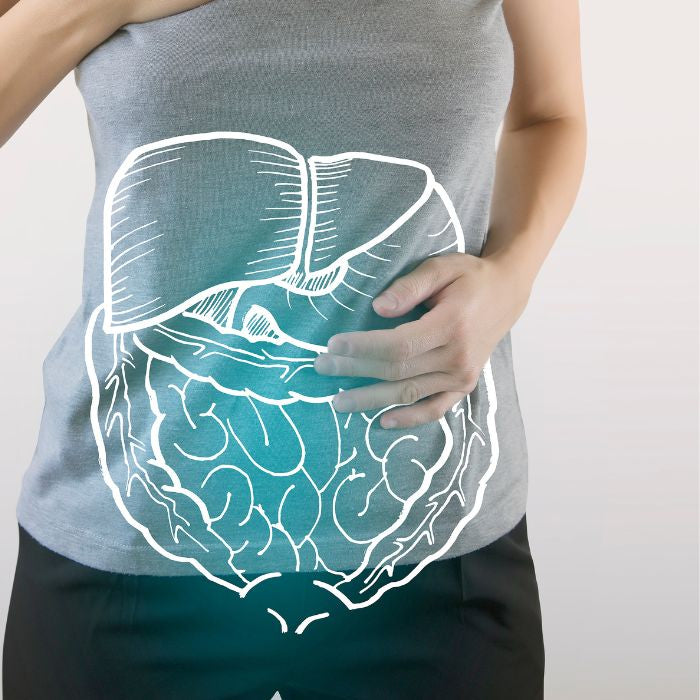
A bloated abdomen, also called abdominal bloating, is literally a feeling of swelling of the abdomen. This feeling is often accompanied by visible swelling. It's a common problem that can cause a great deal of discomfort.
There may be a feeling of fullness, pressure or general discomfort in the abdomen. Ructus (belching, burping), flatulence (flatulence) and sometimes abdominal pain are the most common symptoms.
As mentioned earlier, abdominal bloating is a common discomfort that affects a large portion of the population. It's most common in patients with a functional bowel disorder, such as irritable bowel syndrome. But research also suggests that up to 30% of adults suffer from bloating at some point.
There can be numerous causes attributable to a bloated belly. Hence, it's often a difficult process to find exactly what the problem is. A combination of factors is also possible.
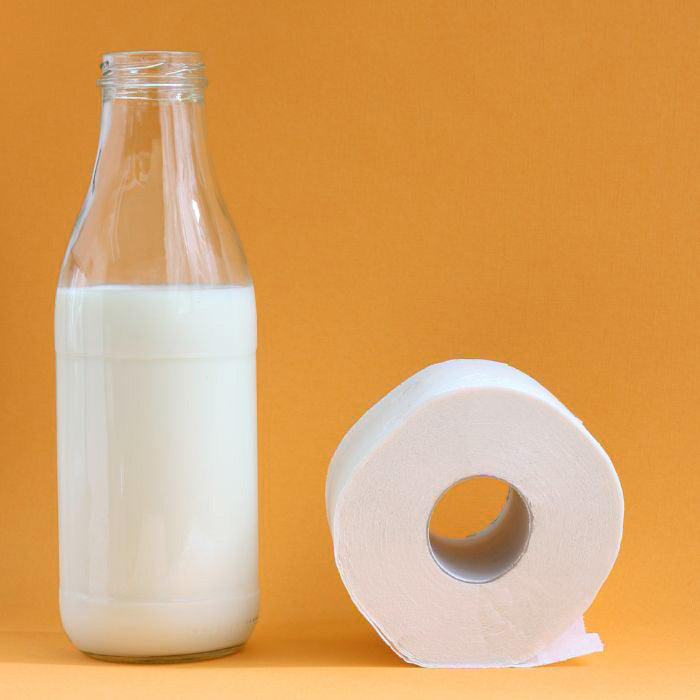
One of the main causes of abdominal bloating is overeating. If one eats too much, the digestive system may have trouble absorbing all that food. This can lead to bloating. In this case, the decreased gastric emptying also leads to an increase in gas production, which adds to the bloating.
Food allergies, such as gluten allergy, and food intolerances such as lactose intolerance, can also lead to a lot of discomfort in the stomach. Lactase, an enzyme essential for digesting lactose, is absent in people with lactose intolerance. As a result, fermentation occurs in the intestines and gas is produced. Similarly, a gluten allergy can cause inflammation of the gut in people with celiac disease. Again, this can lead to symptoms such as bloating and a swollen abdomen.
However, an intolerance to gluten, for example, is much less common than people think. Only 1% of the population has gluten intolerance. So it makes more sense to look for the cause elsewhere.
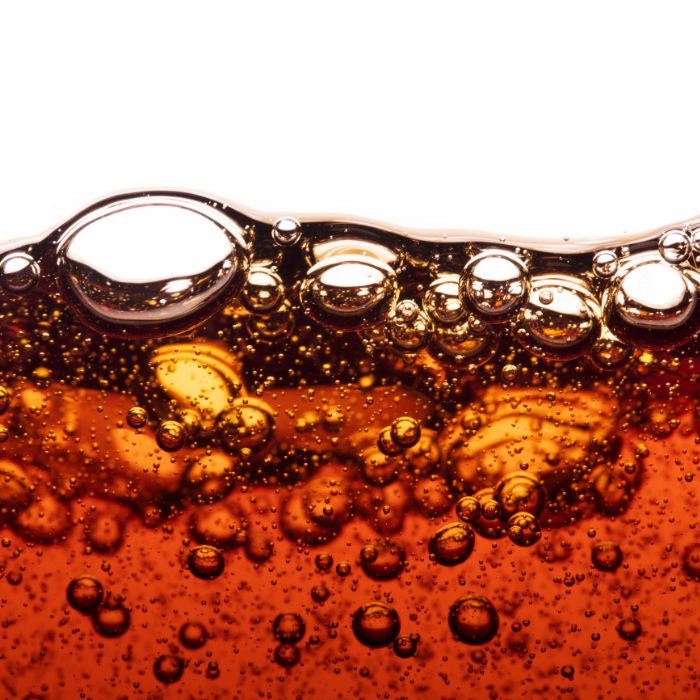
Despite the importance of fiber for optimal digestion, excessive intake of it can lead to bloating. Insoluble fiber in particular can be difficult to absorb. This in turn leads to increased gas production in the digestive system. Thus, legumes, cabbage and whole grain cereals sometimes cause problems.
Delicious, a fresh Coke Zero or glass of sparkling water when you are thirsty. For people who are prone to bloating, however, sparkling beverages are not a good idea. Dissolved carbon dioxide in carbonated drinks can cause gas in the stomach, which can lead to bloating. In addition, these beverages can promote the excretion of gas in the intestines, which further exacerbates the problem.
Thus, if you have symptoms of bloating, it's extremely important to scrutinize dietary habits and rule out any intolerances or allergies.
PDS or irritable bowel syndrome is a chronic disorder of the digestive system that manifests as abdominal pain, bloating and bowel problems such as diarrhea and constipation. Due to intestinal hypersensitivity and disturbances in bowel motility, PDS can lead to severe bloating.
Gastroesophageal reflux disease, also abbreviated as GERD or GORD, is a condition in which acid from the stomach flows back into the esophagus. This causes a burning sensation in the esophagus and often bloating. Acid reflux can cause irritation of the esophagus and a feeling of swelling in the abdomen. This is often seen just after meals.
If stool remains in the colon for too long, it ferments and creates gas. On top of that, the presence of stool can put pressure on the abdomen, which can lead to a feeling of swelling. Since constipation is a common phenomenon, it's one of the most common medical causes of abdominal bloating.
When too many bacteria grow in the small intestine, we speak of “Bacterial overgrowth of the small intestine” or “SIBO. Overfermentation of food causes gas production and bloating. This condition is often accompanied by problems with intestinal motility and can therefore be particularly complex.
Gastroparesis occurs when the stomach muscles work poorly or even not at all. This prevents the stomach from emptying normally. When the stomach then finally empties its contents into the intestine, it does so in an excessive manner.
This causes a feeling of fullness, bloating and nausea. The nerves that regulate the stomach muscles can be affected, often leading one into a vicious cycle. It's a condition common in people with diabetes.
Hormonal changes can have a major impact on abdominal bloating. This phenomenon is often associated with two specific periods in a woman's life: the menstrual cycle and pregnancy.
The female cycle is characterized by regular fluctuations in estrogen and progesterone levels. These hormones are essential for maintaining reproductive health, but can also affect bloating and digestion.
The hormone estrogen causes fluid retention. Therefore, as estrogen rises and progesterone falls, many women often experience bloating. Added to this is the fact that the uterus increases in volume just before menstruation. In addition, estrogen and progesterone often cause gas by slowing or speeding up motility. Estrogen receptors in the digestive tract also affect your visceral sensitivity, making you feel bloated.
Women with premenstrual syndrome (PMS) may experience more intense bloating just before menstruation. This hormonal imbalance can lead not only to slower digestion, but also to flatulence and feeling heavy.
During pregnancy, the body undergoes many important hormonal changes to promote the growth and development of the fetus. These changes can also affect the digestive system in various ways.
Progesterone plays a crucial role in maintaining pregnancy. It relaxes the body's smooth muscles, including those of the intestines. This can interfere with digestion and lead to constipation and bloating. Another hormone, relaxin, also plays a role in relaxing the muscles and ligaments to help the uterus expand. This relaxation can affect bowel motility, which can exacerbate bloating.
The influence of the liver and pancreas

One of the main factors responsible for bloating is a sedentary lifestyle. A lot of people have office jobs and consequently sit virtually all day. With more and more use of home-based work, many people sit all day. If you have to walk from your car to the office, at least you have some exercise.
Lack of exercise slows down digestion. This can lead to an accumulation of gas in the stomach and intestines. If one doesn't exercise, the abdominal muscles do not contract as often as is necessary to move food and gas through the digestive tract. This can lead to a feeling of discomfort. In addition, exercise promotes the production of endorphins, which can help reduce stress.
As we know, stress and anxiety have a major impact on the digestive system. Research from the University of Chicago found that people who experience a lot of stress are more likely to have abdominal pain and bloating. Stress can interfere with bowel circulation. It can slow or speed up bowel movements.
When a person is stressed, their body produces hormones such as cortisol and adrenaline. These hormones affect digestion. They can slow the release of gas and liquids in the stomach. This causes these substances to accumulate. In addition, stress can worsen the symptoms of irritable bowel syndrome.
The link between stress and bloating can be explained by several physiological mechanisms. First, stress can cause visceral hypersensitivity. This means that the nerves in the intestines are more sensitive to swelling and pressure, resulting in increased bloating even when normal amounts of gas are present.
Second, stress can cause changes in intestinal flora. When we feel stress, our body goes into “fight-or-flight” mode. Studies show that chronic stress can change the bacterial composition of the gut. Digestion and food metabolism are affected by macrobiota. An imbalance in this bacterial population can lead to an overproduction of gas, which can cause bloating.
Finally, stress and anxiety can lead to actions that exacerbate bloating. For example, stressed people may swallow more air by talking fast or eating too fast, which is known as aerophagia. In addition, they often eat less healthy, with many processed foods and little fiber, which can worsen digestive symptoms.
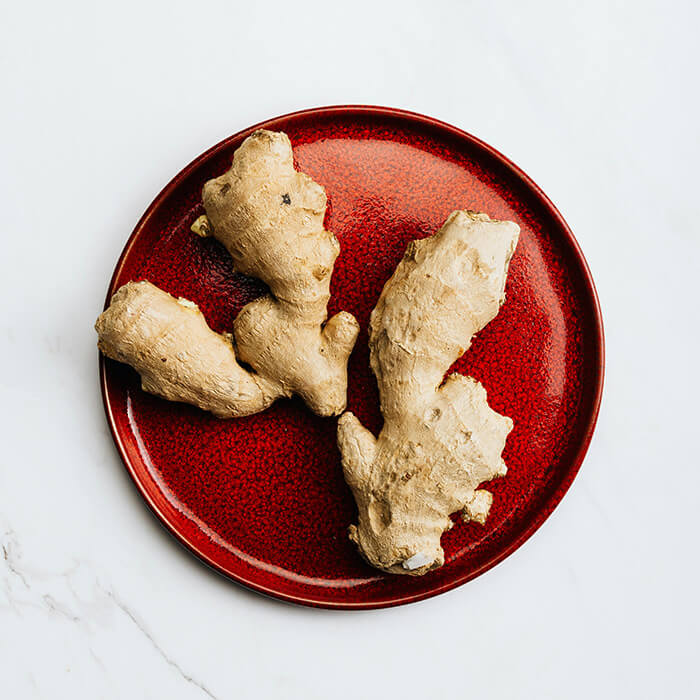
As described earlier, diet often has a major impact on preventing bloating. For example, processed foods can often contain additives and preservatives that can cause bloating. In turn, yogurt and other fermented products can help maintain a healthy gut flora. So it's important to take a closer look at the nutrition plan and make any adjustments.
Dehydration can exacerbate symptoms of bloating. Water helps facilitate digestion. It keeps the digestive system working properly. Some tips to optimize fluid levels:
1. Drink plenty of water: ensure to drink at least 1.5 to 2 liters of water intake per day. This may vary depending on weight, activity level and weather.
2. Peppermint and ginger: infusions of peppermint and ginger can help reduce bloating by calming the digestive system.
3. Avoid carbonated drinks: as mentioned earlier, they can introduce air into the digestive system, which can lead to increased bloating.
Fast food consumption and poor chewing can lead to excessive air intake. According to a study published in the American Journal of Clinical Nutrition, people who ate their food slowly and chewed it well, experienced less bloating.
A good guideline in terms of timing to eat is to devote at least 20 to 30 minutes to each meal. This allows the stomach to let the brain know that enough food was absorbed. The number of times to chew is also important. For example, it's recommended to chew at least 20 times before swallowing. Finally, talking too much while eating can cause air to be swallowed.
Regular exercise can promote digestion and reduce bloating. Activities such as walking, yoga or swimming are particularly beneficial in this regard. According to research published in the World Journal of Gastroenterology, regular exercise has been shown to increase blood circulation in the intestines. This can reduce bloating.
Reduction of stress to a minimum has a significant effect on bloating in a lot of people. Practicing techniques such as meditation, mindfulness and diaphragmatic breathing can help calm the nervous system and improve digestion. Even relaxing activities such as reading, listening to music or taking a warm bath can provide relief.
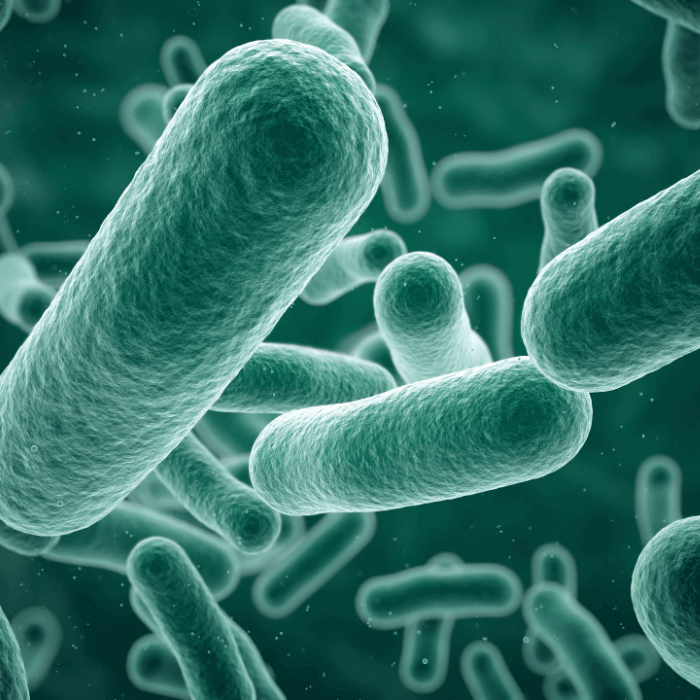
Pre- and probiotics play an important role in healthy digestion. The terms are often used interchangeably, but they do differ.
Prebiotics are undigested fibers. They are carried to the lower part of the small intestine by beneficial bacteria. There they are fermented. These dietary fibers encourage beneficial bacteria to multiply. This improves digestion and strengthens the nervous system. There are several natural foods that contain prebiotics. These include fruits, vegetables, grains, nuts and seeds.
Probiotics, in turn, are live bacteria that are consumed because of their ability to influence the balance of intestinal flora. Fermented products such as yogurt, kefir, pickles, kombucha and kimchi often contain them. Probiotics can help regulate digestion. They also improve gut health. So people often use probiotics for various digestive disorders such as diarrhea, constipation and intestinal infections.
Although the effects of pre- and probiotics are often combined, their mechanisms of action do differ. Dietary fibers known as prebiotics stimulate the proliferation of beneficial bacteria. Probiotics, on the other hand, are live bacteria that directly affect the balance of intestinal flora. Specifically, prebiotics are used to improve digestion and boost the immune system. While probiotics are mainly regarded as a support for digestive disorders.
The quality of both is very important toward their effectiveness. For prebiotics to ferment, they must be stable to reach the small intestine. With probiotics, in turn, it's important that they are alive and active to affect the balance of intestinal flora.
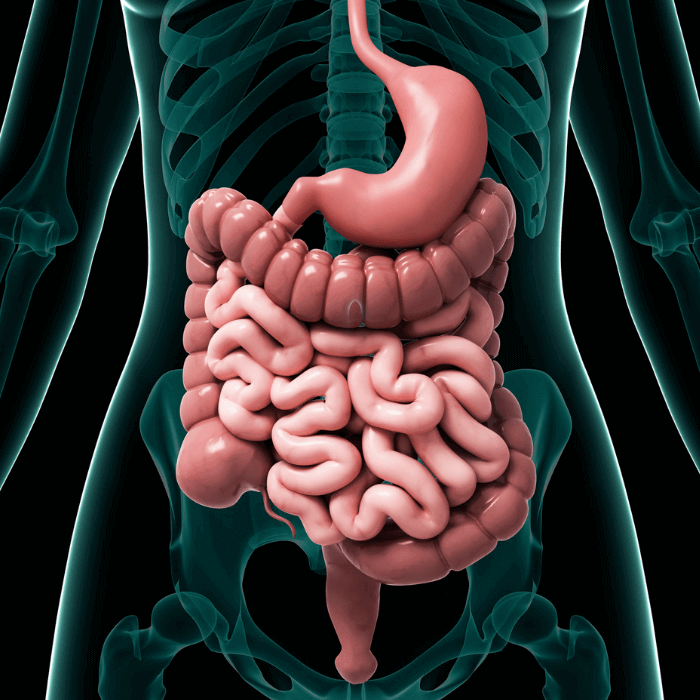
Digestive enzymes are like the tools of digestion. They are proteins that help digest food by breaking down macromolecules into smaller molecules that the body can absorb.
There are different types of digestive enzymes. Each specializes in digesting certain specific nutrients. Fats, for example, are digested by lipase. Proteins, in turn, are digested by pepsin and trypsin. The digestive organs, such as the mouth, stomach and intestines, produce these digestive enzymes.
At Insentials, we did a lot of research into the causes of abdominal bloating and what might offer support. Insentials Gut Repair Day & Night Pack is a pack that works day and night to restore and soothe digestion. This pack contains two different formulas. One for day and one for night.
Insentials Gut Day is designed to promote gut health throughout the day. It contains a unique Pre and pro bacillus blend that nourishes the healthy bacteria in the gut. This promotes a healthy balance of gut flora. Digestive enzymes, in turn, help break down food, reducing bloating and discomfort.
The purpose of Insentials Gut Night is to help restore the digestive system overnight. It supports digestion through various physiological cleansing processes, allowing food to be better digested while we sleep.
These Insentials products have been carefully designed by specialists in the field of digestion. Each ingredient has been chosen for its beneficial properties and precisely dosed to optimize effectiveness.
To support the liver, especially when you recognize digestive symptoms reminiscent of an overburdened liver, there's the Detox Boost that you can take along with the Gut Repair Day & Night Pack. The proven antioxidant supplement Lipoglutathox™ detoxifies the liver efficiently and naturally, thus having a beneficial effect on digestion.